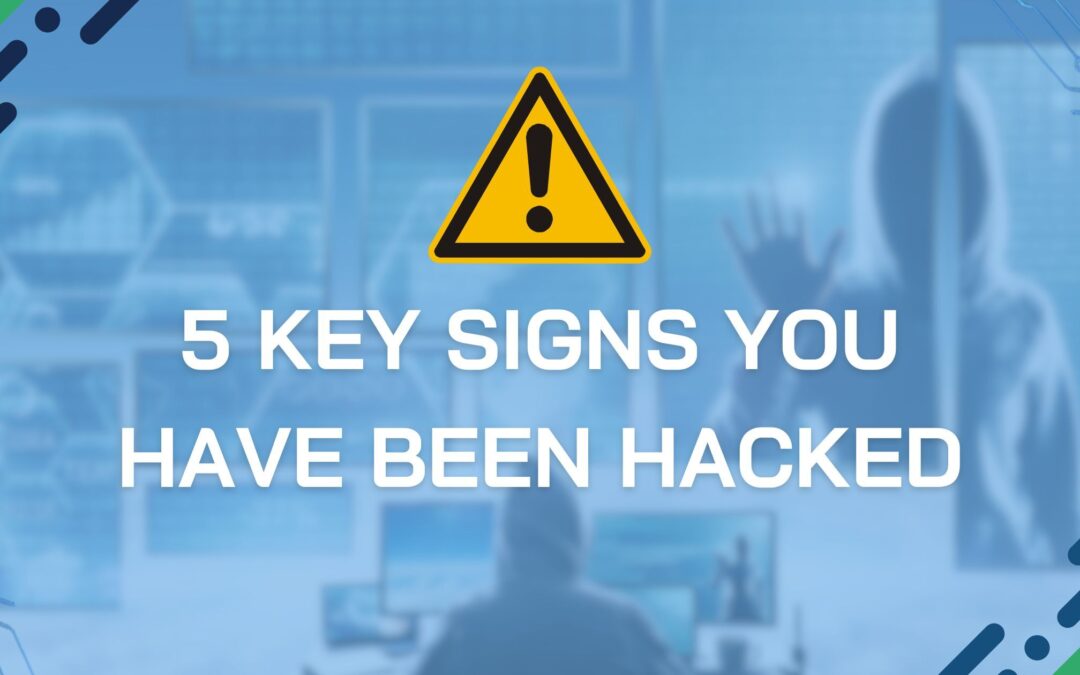Hacking is the unauthorized access to a computer, network, or device, which can lead to severe consequences such as data breaches, financial loss, and reputational damage, not to mention loss of a company as a whole. It is essential to recognize the signs of hacking to minimize the damage and take appropriate actions in a timely manner. Below are five key signs that you have been hacked. While these do not encompass all incidents of hacking, it is a useful guide for what to watch out for.
Unusual Account Activity
One of the first signs of hacking is unexpected account activity. If you notice unfamiliar emails sent from company accounts, unauthorized access to sensitive data, or unexplained password changes and account lockouts, your system may have been compromised. It is important to be aware of both personal and business accounts as information gained from either account can be used to infiltrate your company.
Slow or Unresponsive Systems
Another sign of hacking is slow or unresponsive systems. Performance issues without a clear cause, unexplained spikes in network traffic or resource usage, and frequent crashes or freezing may suggest that your devices are being used for malicious purposes or are struggling to cope with malware. If you notice that your systems are behaving in any way other than expected, it is crucial to investigate and involve a team of cybersecurity experts if there is not a reasonable explanation.
Suspicious Software Activity
Keep an eye out for unfamiliar programs or processes running on your devices. Unexpected pop-ups or warning messages, as well as unauthorized installation or removal of software, can signal that your systems have been infiltrated by hackers. It can be helpful to familiarize yourself with the programs and processes running on your device in order to better assess suspicious software activity.
Unauthorized Financial Transactions
Hacking can lead to unauthorized financial transactions, such as unexpected charges or fund transfers, unexplained changes to financial records, and fraudulent invoices or payment requests. It is crucial to be aware of any financial transactions coming in to or leaving your company accounts. If you spot any of these irregularities, you must act quickly to secure your finances and investigate the issue.
Altered Website Content
If you notice unexpected changes to your website’s appearance or content, it might be a sign that hackers have gained access. You should be aware of all accounts that have access to the administration end of your website as well as what permissions they have. Unauthorized access can lead to your page redirecting users to malicious websites or phishing pages. Be wary of anything unusual happening on your website–if investigation concludes that there is unverified or unauthorized website activity, it is important to work with a team of cybersecurity experts to secure your page and stop hackers in their tracks.
What Can You Do If You Are Hacked?
If you suspect that you have been hacked, it’s essential to respond promptly and efficiently. The longer a hacker is able to access your data, the more damage they can cause not only to your company, but also to your employees and clients or consumers.
The most important element when it comes to stopping hackers is an immediate response. Work to isolate the affected systems, change passwords, and assess the damage. This will help to limit the impact of the attack and protect your remaining assets. An incident response plan is key in this stage as it will provide a means of securing information as well as next steps customized to your company.
As soon as you have identified that your security has been breached, contact IT professionals or cybersecurity experts to investigate the issue and work to resolve it. Not only can they work with you to implement your incident response plan, but they can help to identify the source of the breach, remove malicious software, and restore your systems to a secure state.
Depending on the severity of the breach and the type of data compromised, you may be required by law to notify affected customers and stakeholders. Work with your team internally, along with a team of cybersecurity experts, and if necessary a legal team to ensure that you are following all necessary steps in terms of handling the breach.
While the goal is to never experience a cyber attack, it is likely that every company will experience a threat of some sort. Once a threat has been neutralized, take the opportunity to learn from the incident and implement stronger cybersecurity measures to prevent future attacks. This might include upgrading your software, implementing multi-factor authentication, and strengthening your firewall. A team of cybersecurity experts can assist you in assessing the situation and recommending how to move forward in order to prevent future attacks.
Prevention is key, even if you have already experienced a cybersecurity attack. It is commonly believed that experiencing one cyber attack prepares you for all cyber attacks, however this could not be further from the truck. Each attack and threat actor are unique, and while they may use similar tools, it is important to stay on your toes and consistently evaluate your risk level. Maintaining a strong security posture is an ongoing process. Regularly work with experts to audit your systems for vulnerabilities and ensure that your employees are trained in cybersecurity best practices.
By recognizing the signs of hacking and taking prompt action, you can minimize the impact of a breach and protect your organization’s valuable assets.

